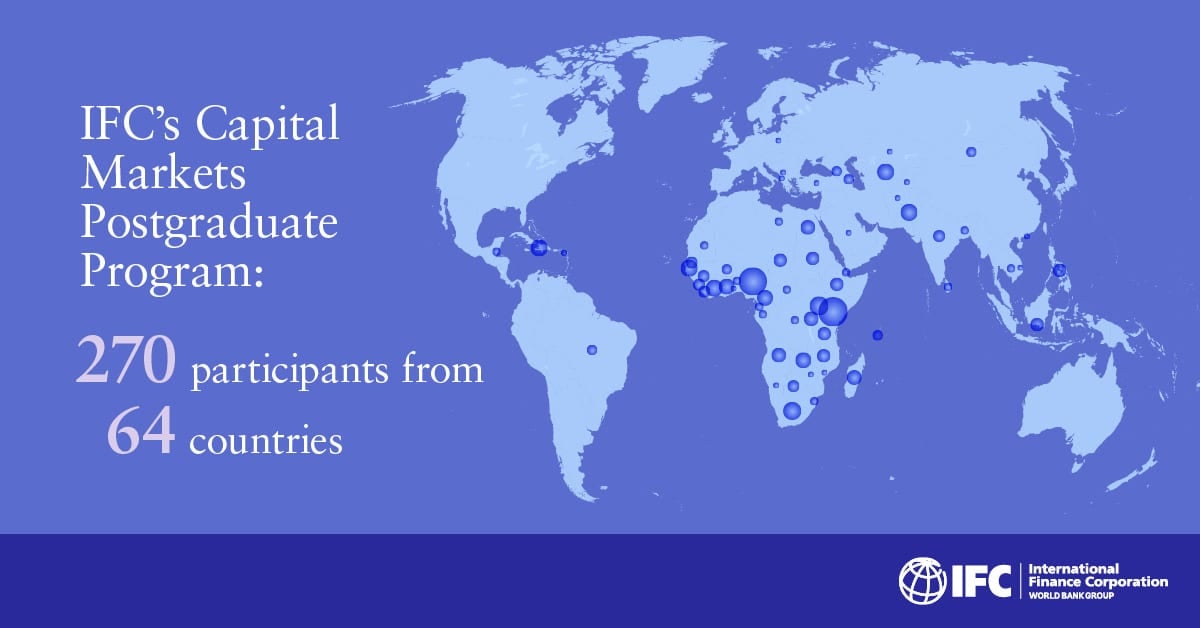
A mid-career executive program opens perspectives to market development in emerging economies
It’s a recurring problem in developing countries. Governments and local businesses lack the liquidity to finance pressing development projects and priorities. Borrowing money from distant financial hubs leaves them vulnerable to currency fluctuations.
This underscores the urgent need to develop local capital markets that connect investors to the critical needs of the economy. By doing so, these markets can reduce dependence on foreign debt and support stable growth. Yet in developing countries, capital markets often struggle to thrive, increasing the demand for knowledge sharing to advance their development.
In 2016, International Finance Corporation, the private-sector arm of the World Bank Group, partnered with the Milken Institute to create an ambitious program to transfer that knowledge by building the capacity of capital market regulators and financial professionals in middle- and lower-income countries.
The program equips participants with advanced skills, knowledge, and experience to develop effective and sustainable local capital markets in their home countries. In 2021, the English program was expanded to include francophone countries in partnership with Paris Europlace.
So far, the Capital Markets Postgraduate Program has brought 270 officials from 64 developing and emerging economies to George Washington University in Washington, D.C., USA and Université Paris Dauphine-PSL in Paris, France. In August 2024, the U.S. side of the program moved to Georgetown University.
The participants undergo nine months of rigorous training on financial markets and on how they can be leveraged to address their home countries’ development needs.
Just as important as the training itself is the networking in the years that follow. Graduates return home and exchange ideas and expertise with each other and other colleagues, mentoring junior staff and sharing knowhow.
IFC recently carried out a survey of the program’s graduates on their professional growth and impact. It’s a diverse bunch—officials from the central banks of Madagascar, Egypt, and Botswana, regulators from Kenya, Pakistan, Uzbekistan, and the Philippines, to cite but a few examples. What joined them was a conviction that the program had helped their careers and given them useful knowledge they could share with colleagues.
At their home institutions, a striking 77% of respondents reported taking on new responsibilities, highlighting a significant shift in their roles. Nearly half said they were promoted, and 94 percent said they had gone on to mentor others with the knowledge derived from the program—a good sign that vertical knowledge-sharing has led to the horizontal variety, as the program’s designers had hoped.
The program has spread valuable knowledge across ministries of economy and finance, central banks, securities and exchange commissions, and stock exchanges throughout the emerging market economies.
Testimonies reflected these gains. After graduating in 2017, Christopher Legilisho was closely involved in helping the Nairobi Securities Exchange get approvals from the central bank to establish a derivatives market—which strengthens investors’ participation through a more efficient distribution of risk and allows domestic companies to access long-term financing.
Leah Simasiku joined a green-finance working group at Zambia’s Securities and Exchange Commission that helped design the country’s first green bond—a $200 million issuance for renewable energy. “When I have a new project, I search the network and find out which jurisdictions have done something similar,” said Simasiku, so her team can work on innovative capital markets products “without having to reinvent the wheel.”
“You always have someone to ring,” says Kenya’s Kefa Michael Ngoiri. “You can discuss something over the phone and before you know it, you’ve come up with a solution.”
The program has helped officials gauge the power of capital markets to strengthen their economies. “We have an economy that is so vast, so rich in every aspect. But we have a capital market that is yet to grow to its potential. In a country of over 200 million people, you have a listing of just 150 to 200 public companies,” said Dr. Timi Agama, a 2017 graduate who, in 2024, became Director General of Nigeria’s Securities and Exchange Commission.
Through the Capital Markets Postgraduate Program, education is proving to be a foundation for advancing local capital markets—one of development’s most critical and promising areas.
Click here to download IFC’s Capital Markets Postgraduate Program report.

